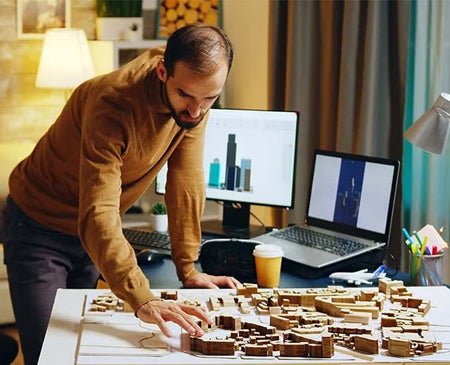Eligibility restrictions apply: only Australian citizens or permanent residents are eligible to apply for this course.
Why study the Graduate Certificate in Urban Planning and Design with UTS Online?
Top 100 University Globally1
Top Performing Young University2
5 star rated for excellence across 8 categories3
5 stars for student retention4
1QS World University Rankings, 2026. 2THE Young University Rankings, 2024. 3QS Stars Rating 2021-2024. 4Good Universities Guide, 2022.
Gain the foundations to shape urban environments
Australia's population is predicted to reach between 28.3 and 29.3 million people by 2027. For Australian cities and towns to continue to grow, many of the key decisions required to successfully cater for change are happening right now - showing the demand for more skilled professionals in this area.1
The UTS Online Graduate Certificate in Urban Planning and Design is designed for aspiring urban planning and urban design professionals who want to gain the foundational knowledge and skills to become effective planners and/or designers of sustainable urban environments.
Delivered 100% online, with part-time study, this course enables you to work full-time while developing the knowledge and the skills to make a positive difference to the cities, towns and communities of our future.
1Australian Bureau of Statistics
Who is this course for?
The Graduate Certificate in Urban Planning and Design is suitable for professionals who want to gain the foundational knowledge and skills to become effective planners and/or designers of sustainable urban environments.
Students of this course might come from a range of professional backgrounds and work in roles such as:
- Teacher
- Lawyer
- Project Manager
- Project Officer
- Environmental Scientist
- Environmental Sustainability Advisor
- Field Officer
- Junior Architect
- Interior Designer
- Environmental Scientist
- Town Planner
Please note: This course is only available to Australian citizens and permanent residents. See entry requirements under course information for more eligibility information.
What you will study
The UTS Online Graduate Certificate in Urban Planning and Design comprises four subjects (24 credit points [CP] in total).
Complete the following subjects:
- Property Development and Planning Process
- Sustainable Urban Development
- Planning and Design Theory and Decision Making
- Urban Design Fundamentals
Note: Most UTS Online subjects are valued at 6 credit points each. For detailed subject descriptions and further information, please download a course guide.
Flexible course options
The Graduate Certificate in Urban Planning and Design comprises 4 online subjects (24 credit points [CP] in total).
Students who complete the Graduate Certificate in Urban Planning and Design may qualify to advance to the Master of Urban Planning, requiring only 11 additional subjects to complete the Master's degree.
Students who complete 8 subjects (48 CP) from the master's may be eligible to exit with a Graduate Diploma in Urban Planning.
Graduate Certificate
4 Subjects | 8 months
Or continue studying
Master of Urban Planning
+11 Subjects | 30 months
Graduate with a Master's degree
One of our Student Enrolment Advisors can assist you with more information, including alternative pathways.
Learning outcomes
Design people-centred and sustainable urban spaces
Apply urban design principles to create vibrant, functional and sustainable environments. Integrate social, economic and environmental considerations to enhance the liveability of cities and communities.
Develop strategic urban planning solutions
Analyse urban growth trends and spatial dynamics to inform planning decisions. Use evidence-based strategies to design urban solutions that balance development, infrastructure and sustainability.
Engage and collaborate with diverse stakeholders
Refine your ability to communicate complex urban planning and design concepts. Work effectively with government agencies, industry professionals and communities to drive inclusive and impactful urban development.
Apply digital tools and emerging technologies in urban design
Utilise cutting-edge planning methodologies, spatial data analysis and digital modelling to visualise and optimise urban spaces. Leverage technology to enhance decision-making and drive innovative design solutions.
Course information
Entry requirements
Currently, this course is only accepting applications from Australian citizens or permanent residents.
Applicants must have one of the following:
- Completed Australian bachelor's, bachelor honours degree, or master’s degree, or overseas equivalent
OR
- Completed one of the following UTS qualifications, with a minimum GPA of 5/7
OR
- Completed Australian graduate certificate or graduate diploma, or overseas equivalent, in a related field of study# with a minimum GPA of 5/7 AND a minimum of 1 year full-time, or equivalent part-time, relevant professional work experience#
OR
- A minimum of 3 years for senior positions or 5 years for mid-career positions full-time, or equivalent part-time, relevant professional work experience#
# Related fields of study and areas of relevant professional work experience include: Architecture and Urban Environment, Building Surveying, Building Construction Economics, Valuation, Human Geography, Geomatic Engineering, Environmental Studies, Law, and Economics.
Supporting documentation to be submitted with the application
For applicants who need to demonstrate professional work experience:
- Curriculum Vitae AND Statement of service in one of the following formats:
- A 'Statement of Service' provided by the employer
- A completed 'UTS statement of service’ signed by the employer
- A statutory declaration confirming professional work experience (Australian residents only)
- An official letter from the applicant’s accountant or solicitor, on company letterhead, confirming the applicant’s professional work experience or engagement with the business, duration of operations, and nature of the business
- A business certificate of registration in original language and English (e.g. provision of ASIC documentation or ABN or similar documentation for Australian Businesses)
Eligibility for admission does not guarantee an offer of a place.
Want to check your eligibility?
Not only do we have the right tools and support teams to help you – we have people who care about your success.
Career outcomes
The UTS Online Graduate Certificate in Urban Planning and Design provides foundational knowledge and skills for professionals eager to contribute to sustainable and innovative urban development. This course is ideal for those seeking to expand their career options or transition into the dynamic field of urban planning.
Upon completion, graduates can pursue a variety of roles, including:
- Urban Planner (entry-level roles)
- Development Assessment Officer
- Planning Assistant
- Urban Design Coordinator
- Environmental Planning Officer
$80,000
Average salary
Graduates with a Graduate Certificate in Urban Planning can expect an average starting salary of $80,000, based on entry-level roles such as Urban Planner, Development Assessment Officer and Planning Assistant.
(Planning Institute of Australia)
82%
Increase in urban planners since 2006
The number of urban planners in Australia has grown by 82% since 2006, highlighting rising demand in urban and regional planning.
(Planning Institute of Australia)
1,400
Annual employment growth
Urban and Regional Planning in Australia has seen annual employment growth of 1,400 positions, underscoring expanding opportunities in the sector.
(Jobs and Skills Australia)
Upcoming intakes
UTS Online courses have 6 intakes per year. The diagram below shows all upcoming intakes. Our next intake is highlighted below.
-
Jan
2026 -
Mar
2026 -
May
2026 -
Jul
2026 -
Aug
2026 -
Oct
2026
Meet our Course Director
Mukesh is an architect, urban planner, and educator whose interdisciplinary work spans urban planning, geographic information systems (GIS), remote sensing, and environmental sustainability. He brings extensive experience in academic and professional roles, combining expertise in computational GIS, remote sensing, and urban analytics to address pressing urban and regional issues.
With a strong focus on evidence-based strategies, Mukesh’s research explores sustainable planning solutions for urban growth, land use transformation, and mitigating urban heat island effects. As an educator at the University of Technology Sydney, Mukesh guides students to critically assess and navigate complex urban issues through a robust understanding of spatial analysis, urban analytics and planning research methods. His teaching is deeply informed by his research and professional planning experience, fostering future planners and designers equipped to implement sustainable and socially conscious planning solutions.
Mukesh Ray
Course Director, Graduate Certificate in Urban Planning and Design
Download a course guide
Download a course guide to explore detailed subject descriptions, entry requirements, pathway options and fee information.
Frequently asked questions
Currently, this course is open to domestic students only. To be eligible, you must be an Australian citizen or an Australian permanent resident.
Yes, the Graduate Certificate in Urban Planning and Design is designed for aspiring professionals seeking foundational knowledge and skills to become effective planners or designers of sustainable urban environments.
Not necessarily. If you don’t hold a formal qualification, but have 3–5 years of relevant work experience, you may still be eligible for admission to the Graduate Certificate in Urban Planning and Design. This program serves as a foundation course and provides a pathway to the Master of Urban Planning, equipping you with the essential skills to advance your career in urban planning.
Graduates of the Graduate Certificate in Urban Planning and Design can pursue roles such as Urban Planner, Urban Designer, Environmental Sustainability Advisor or Project Manager. The foundational skills gained prepare you for various positions focused on creating sustainable urban environments.
Yes, successful completion of the Graduate Certificate in Urban Planning and Design provides a pathway to the Master of Urban Planning, allowing you to further specialise and advance your expertise.
Urban design focuses on the physical form and experience of places, including streets, public spaces, neighbourhood character and the human-scale qualities that shape how people interact with the built environment. Master planning operates at a broader, more strategic level, guiding long-term land use, transport networks, infrastructure, environmental management and the overall structure of precincts or districts. While urban design addresses how places feel and function, master planning determines how larger areas grow and change over time.
A planning and urban design course, such as the UTS Online Graduate Certificate in Urban Planning and Design, explores both scales, helping learners understand how detailed design principles intersect with strategic planning frameworks.
Urban planning is in demand across Australia due to population growth, rising housing needs, infrastructure expansion and increasing pressure to plan for climate resilience and sustainability. Governments, developers and consulting firms are seeking planners who can balance social, environmental and economic considerations while navigating policy and regulatory frameworks.
A recognised urban planning course, like the UTS Online Graduate Certificate in Urban Planning and Design, provides an example of how people can build skills in areas such as strategic planning, climate-responsive design and digital planning tools to meet this demand.
Urban planners in Australia typically earn between $75,000 and $120,000 (Seek.com), with salaries varying based on experience, location, sector and level of responsibility. Senior planners, strategic planners and specialists in transport, policy or environmental planning often earn at the higher end of this range. Salaries may also increase in regions with high development activity or strong infrastructure investment.
A postgraduate urban planning course, such as the UTS Online Graduate Certificate in Urban Planning and Design, can help support progression into more advanced or higher-earning planning roles by building recognised skills in planning systems, design thinking and urban analysis.
People often begin in urban planning by developing foundational knowledge in land use, policy, spatial analysis, community engagement and city systems. Many entrants come from related fields such as architecture, geography, environmental studies, public policy or construction and then complete an urban planning course to formalise their skills. Gaining familiarity with planning frameworks, development processes and mapping tools also helps build early capabilities.
The UTS Online Graduate Certificate in Urban Planning and Design provides an example of a structured entry point, offering introductory skills in planning, design, policy and spatial thinking for people transitioning into the field.
Urban design focuses on the physical qualities of places, streets, public spaces, built form, character and the human experience of environments. Urban planning addresses broader systems such as land use regulation, transport networks, infrastructure, environmental management and long-term city strategy. Designers shape the form and feel of places, while planners shape the policies and frameworks that guide urban growth.
A combined planning and design course, like the UTS Online Graduate Certificate in Urban Planning and Design, brings these perspectives together, helping learners understand how detailed design and strategic planning connect in real-world projects.
At UTS Online, your success is our priority, and that doesn't change when you study remotely. We're committed to providing you with a comprehensive range of student support services, guiding you from enrolment right through to graduation.
As a UTS student, you'll enjoy access to an array of support services, including:
Your own dedicated Student Success Advisor, available to answer any course-related questions you may have to keep you on track
-
UTS Career Hub for work experience and networking opportunities
-
Assignment writing and academic support from teachers and lecturers
-
Public speaking and peer learning support
-
Confidential medical and mental health services.
Connect with us to learn more about how we support your success while studying for a Graduate Certificate in Urban Planning and Design at UTS Online.
Assignments in our subjects are authentic and relevant. They vary according to the subject and include, but are not limited to, posters, online quizzes and vivas (oral assessment), podcasts, recorded presentations, education tools, proposals, protocols and professional portfolios. You will be required to complete exams for a few of the subjects in the course or related certifications. There are also group assignments as part of the assessments to graduate with a Graduate Certificate in Urban Planning and Design.
When studying the Graduate Certificate in Urban Planning and Design, your online study experience includes:
-
Modules on urban planning, sustainability, and design principles
-
Resources for applying concepts in real-world scenarios
-
Flexible schedules and peer discussion boards
Here’s a video example showcasing key features of our online learning platform, including tools designed to enhance your study experience.
For practical tips on balancing your studies with work and life, click here to learn how to achieve your goals. Remember, our team is just an email or call away to support you every step of the way.













